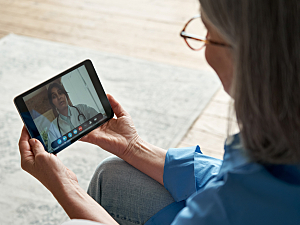By the end of April 2020, the COVID-19 pandemic had prompted a 130-fold increase in telehealth visits by U.S. Medicare recipients, from about 13,000 per week to more than 1.7 million per week.
The Division of Aging at Brigham and Women’s Hospital was part of that surge, moving to virtual delivery of care at the height of the pandemic in the Boston area and keeping most outpatient visits virtual thereafter. Clinicians adapted the comprehensive geriatric assessment (CGA), a standardized framework for the evaluation of older adults, to be suitable for telephone and video visits. The goal was to protect vulnerable older patients from the COVID-19 pandemic while still providing up-to-date, timely medical care.
Tammy T. Hshieh, MD, MPH, associate physician in the Brigham’s Division of Aging, Julia V. Loewenthal, MD, a geriatrician in the division, and colleagues described the process in a letter to the editors of Age and Ageing.
Domains With No Differences
During telehealth visits, it was possible to evaluate six of the 11 CGA domains in the same way as during in-person visits:
- Comorbidities—Chart review and clinical interview (the latter was improved with the involvement of the care partner)
- Function—Review of basic and instrumental activities of daily living
- Mood—Patient Health Questionnaire–2 or –9, Geriatric Depression Scale, Generalized Anxiety Disorder –2 or –7, or other indicated tools
- Social domains—Interview about matters such as home services, social network, and caregiver stress/support
- Frailty—FRAIL scale (fatigue, resistance, ambulation, illnesses, and loss of weight), Clinical Frailty Scale, and/or a frailty index
- Advance care planning if indicated—Serious illness conversation and completion of a health care proxy and/or medical orders for life-sustaining treatment form (the latter was done via two-clinician verbal authorization, electronic communication or postal mail)
Domains Adjusted
Nearly all elements of the other domains could be evaluated with minor adjustments:
- Geriatric medication review—A semi-structured interview was completed as usual; medication reconciliation in the home was substituted for review of a chart list
- Mobility—A falls screen was completed; chair stands were observed during video visits; the Timed Up and Go test and gait speed could not be evaluated, but gait and movement in the living space were observed during video visits
- Sensory—In-person visits include a finger rub/whisper test for hearing and a vision screen; these could not be completed remotely
- Cognition—A clinical interview was completed; video visits included the Mini-Cog or Montreal Cognitive Assessment (MoCA); telephone visits included the Confusion Assessment Method or telephone MoCA
- Nutrition—In-person visits include a physical exam, questioning about food access and food quality, measurement of weight and the Mini Nutritional Assessment; all of these were completed remotely except the patient measured their own weight on a home scale if available and no physical exam could be conducted during telephone visits
Feasibility
The Brigham uses videoconferencing technology integrated into the electronic health record, which requires patients to have access to a smartphone, tablet or computer, in addition to an internet connection or cellular data. At the time of this writing, approximately 25% of remote visits with Division of Aging clinicians had occurred via video and 75% had been conducted by telephone only.
71% of clinicians in the division said patients found telehealth acceptable all of the time and 29% said they found it acceptable most of the time.
It is expected that this model for CGA will continue to evolve, but during the COVID-19 pandemic it demonstrates an opportunity to provide high quality care pivoted to virtual telemedicine. Future work will be important to identify domains that can be adequately assessed during both in-person and telehealth visits.
